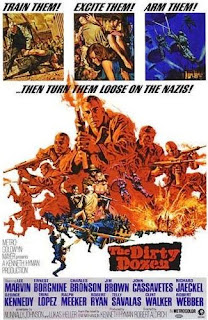The Dirty Dozen
My wrap-up of the Robert Ryan film festival is two iconic films from the 1960s that, amazingly, I haven't seen before. The Dirty Dozen, directed by Robert Aldrich, was the number-one box office earner of 1967, but somehow I've avoided it all these years. It's not a very good film, but it scratches an itch.
What's most interesting about the film is that it takes the standard World War II movie template but twists it for '60s sensibilities. Most know that it is about a dozen men who, either facing long prison sentences or execution, are recruited for a secret mission to storm a French chateau riddled with German officers. The twelve men, played by a variety of stars, unknowns, and future stars, end up representing the rebellion of 1960s counterculture.
Lee Marvin plays the major assigned to train them. Marvin was the prototypical '60s tough guy. He was hard-assed, but you always got the sense he was tolerant. One can see him being one of those ex-Marines who would get along fine with long-haired hippie freaks. His manner of speech was always ultra-cool, and his character is a discipline problem himself, pissing off his superiors, like generals played by Ernest Borgnine and Robert Webber, and particularly a colonel played by Ryan.
The principles of the "Dozen" are John Cassavetes, as a wormy Mafioso (he was nominated for a Best Supporting Actor Oscar, but only did the role to make money to make his own movies); Charles Bronson, as the most responsible of the group; Telly Savalas, as a sadistic, woman-hating, psychopathic racist; Jim Brown (who quit football to take the part), as a black man in a segregated army, and Donald Sutherland, who isn't given much of a character but does have a memorable scene when called upon to impersonate a general.
The film is too long--a scene in which the Dozen prove themselves during war games is kind of ridiculous. The better scenes involve the men coming together as a team, Unfortunately some of the Dozen are hardly referred to at all. Trini Lopez is one of them, and he's given a song (not a great moment), but is killed off-screen.
The final scene, the raid on the chateau, is bloody and brutal, with the Germans killed by being penned into a bunker and burned alive (along with women). Aldrich was pressured to cut that scene, but did not. There's a kind of viciousness which eliminates any sense of patriotism, and may be what Quentin Tarantino had in mind with Inglourious Basterds.
What's most interesting about the film is that it takes the standard World War II movie template but twists it for '60s sensibilities. Most know that it is about a dozen men who, either facing long prison sentences or execution, are recruited for a secret mission to storm a French chateau riddled with German officers. The twelve men, played by a variety of stars, unknowns, and future stars, end up representing the rebellion of 1960s counterculture.
Lee Marvin plays the major assigned to train them. Marvin was the prototypical '60s tough guy. He was hard-assed, but you always got the sense he was tolerant. One can see him being one of those ex-Marines who would get along fine with long-haired hippie freaks. His manner of speech was always ultra-cool, and his character is a discipline problem himself, pissing off his superiors, like generals played by Ernest Borgnine and Robert Webber, and particularly a colonel played by Ryan.
The principles of the "Dozen" are John Cassavetes, as a wormy Mafioso (he was nominated for a Best Supporting Actor Oscar, but only did the role to make money to make his own movies); Charles Bronson, as the most responsible of the group; Telly Savalas, as a sadistic, woman-hating, psychopathic racist; Jim Brown (who quit football to take the part), as a black man in a segregated army, and Donald Sutherland, who isn't given much of a character but does have a memorable scene when called upon to impersonate a general.
The film is too long--a scene in which the Dozen prove themselves during war games is kind of ridiculous. The better scenes involve the men coming together as a team, Unfortunately some of the Dozen are hardly referred to at all. Trini Lopez is one of them, and he's given a song (not a great moment), but is killed off-screen.
The final scene, the raid on the chateau, is bloody and brutal, with the Germans killed by being penned into a bunker and burned alive (along with women). Aldrich was pressured to cut that scene, but did not. There's a kind of viciousness which eliminates any sense of patriotism, and may be what Quentin Tarantino had in mind with Inglourious Basterds.



Comments
Post a Comment